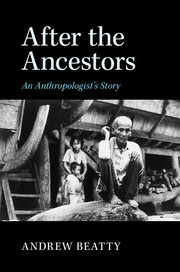Book contents
- Frontmatter
- Epigraph
- Contents
- List of illustrations
- Preface
- People
- Map
- Prologue
- 1 The statue
- 2 House key
- 3 Among women
- 4 Blood brothers
- 5 Daggers and debutants
- 6 Stormy Sunday
- 7 Three things that matter
- 8 The making of great men
- 9 A game of chess
- 10 Cholera song
- 11 Progress
- 12 Brothers and strangers
- 13 Exile and return
- 14 Field work
- 15 The chicken's neck
- 16 Good deaths and bad deaths
- 17 First family
- 18 Blessing
- 19 Half an egg
- 20 Waiting
- 21 Death of a chief
- 22 Ama Jonah at bay
- 23 Unravelling
- 24 The ethnographer and his double
- Epilogue
- Index
24 - The ethnographer and his double
Published online by Cambridge University Press: 05 March 2015
- Frontmatter
- Epigraph
- Contents
- List of illustrations
- Preface
- People
- Map
- Prologue
- 1 The statue
- 2 House key
- 3 Among women
- 4 Blood brothers
- 5 Daggers and debutants
- 6 Stormy Sunday
- 7 Three things that matter
- 8 The making of great men
- 9 A game of chess
- 10 Cholera song
- 11 Progress
- 12 Brothers and strangers
- 13 Exile and return
- 14 Field work
- 15 The chicken's neck
- 16 Good deaths and bad deaths
- 17 First family
- 18 Blessing
- 19 Half an egg
- 20 Waiting
- 21 Death of a chief
- 22 Ama Jonah at bay
- 23 Unravelling
- 24 The ethnographer and his double
- Epilogue
- Index
Summary
– Life? When was it ours?
When are we really what we are?
Octavio PazFieldwork demands a double life. It stretches public and private selves across different worlds. The self made in Nias and the English self, Ama Bute and Andrew Beatty, were so far apart that it became harder and harder to shuttle between them, or to recognize one AB in the other. The abrasive, tenacious Niha self lived off a shallow inner life; it could draw upon no past experience, no childhood sentiments. But its claims were imperious; it thrust upon one's thoughts (whose thoughts?); it pushed aside other things; its routines left no room for the older, milder self.
That English self was visible only to my wife, and once she had gone, to no one. But what was it anyway? What remained after language, manner, social sentiments and biography had been pared away? What my fellow niha made of me took no account of these invisible attributes, and my urgent professional desire was to close the gap: not to become one of them, but to become, in their eyes, more like them, and to see things from where they stood. Unknown to others, the anthropologist ceases to be real to himself.
But the work continued, the field notes accumulated, proving not merely that I was there but that I was there. The diary kept its momentum – this book is the proof – though I was no longer translating my experience for myself or some imaginary reader but merely recording, impersonally, what happened on a given day: in the thick of events the intrusive self had melted away. Except as an instrument of recording, I was absent.
I had one name but many personae: first, the foreigner, outsider and investigator of custom – a creature as inescapable as my conspicuous whiteness and size. I was also a neighbour, villager, friend, and – as village life would have it – in-law, son, and clansman. But an actor is more than the sum of his parts, more than his scripts.
- Type
- Chapter
- Information
- After the AncestorsAn Anthropologist's Story, pp. 357 - 362Publisher: Cambridge University PressPrint publication year: 2015



